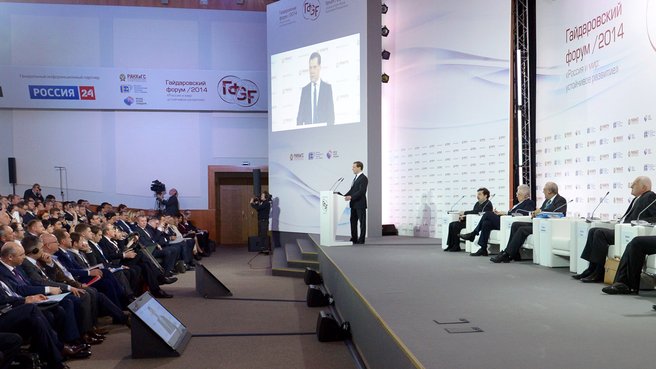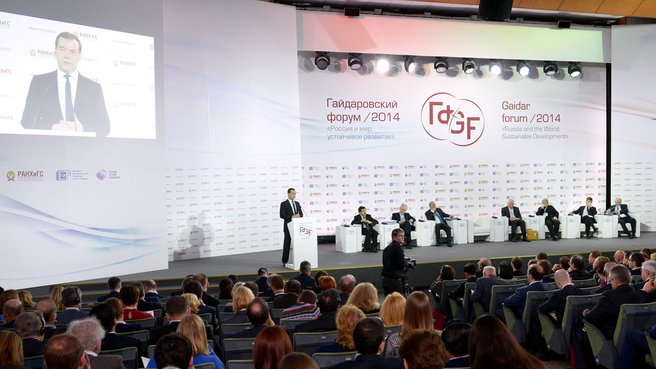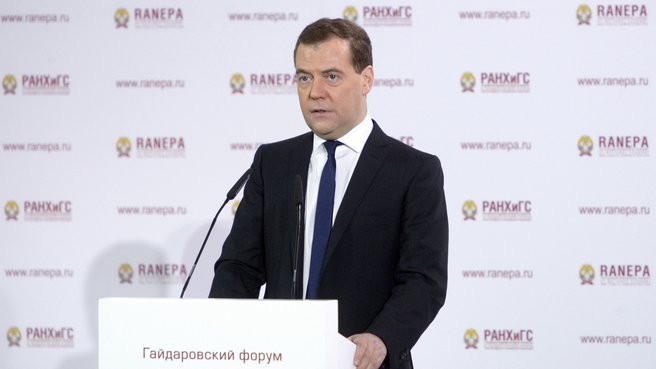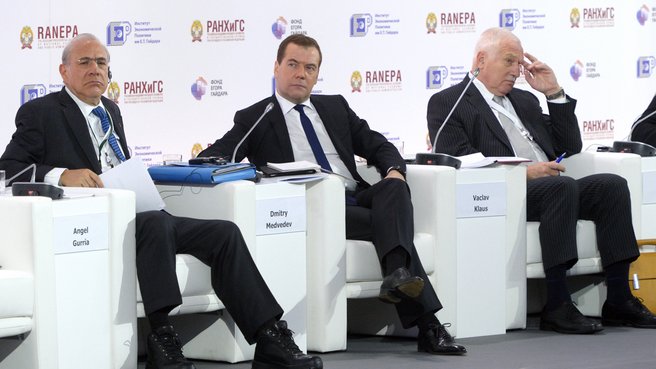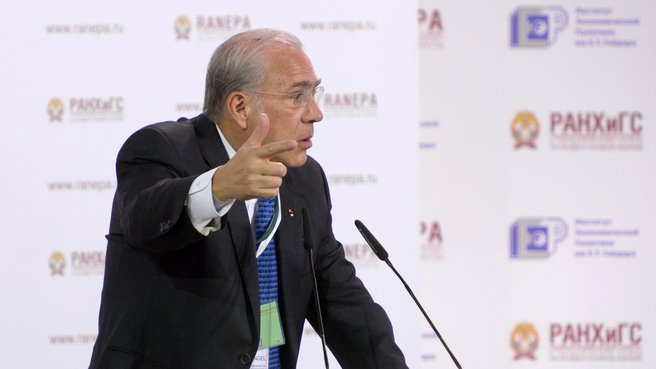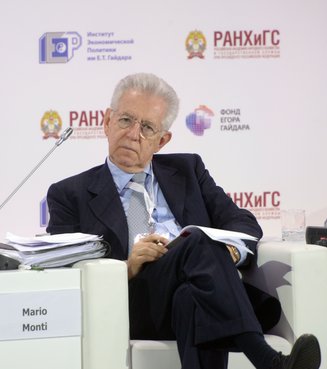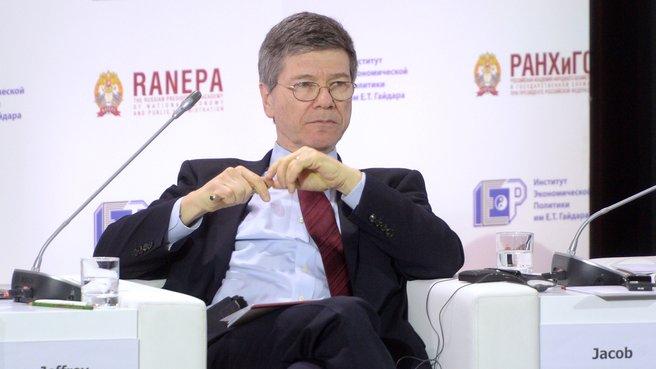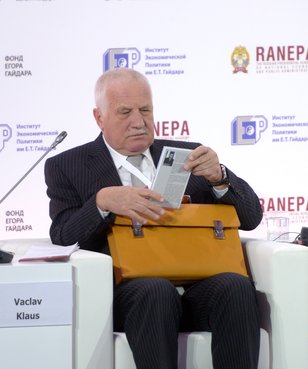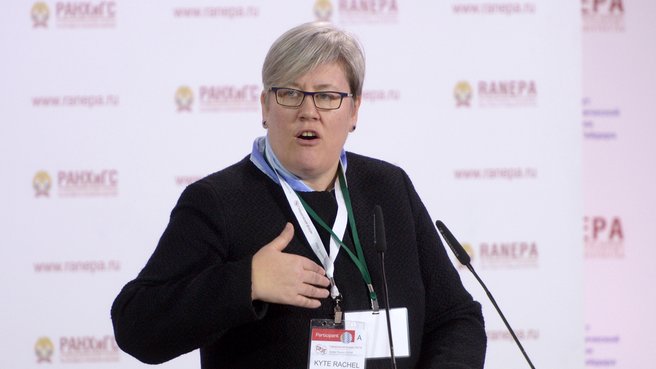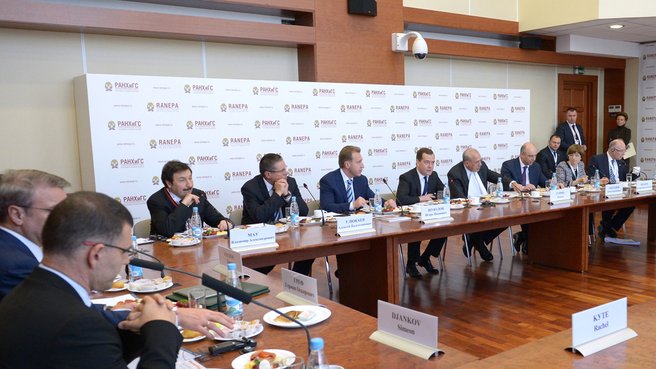The Gaidar Forum is an institutional platform for discussing the key challenges facing the world today. This year, the forum focused on global post-crisis development, macroeconomic risks and the possibility of another recession, the role of infrastructure in ensuring sustainable development, the outlook for energy markets and contradictions of resource-based economies, social stability and an effective healthcare system.
Dmitry Medvedev has taken part in a plenary session, Contours of a Post-Crisis World, as part of the 5th Gaidar Forum.
At the conclusion of the plenary session, the Prime Minister met with representatives of the expert community.
Dmitry Medvedev’s opening remarks:
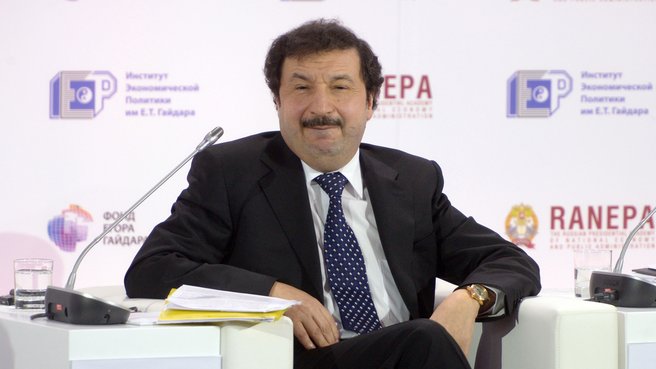
Rector of the Russian Presidential Academy of National Economy and Public Administration Vladimir Mau
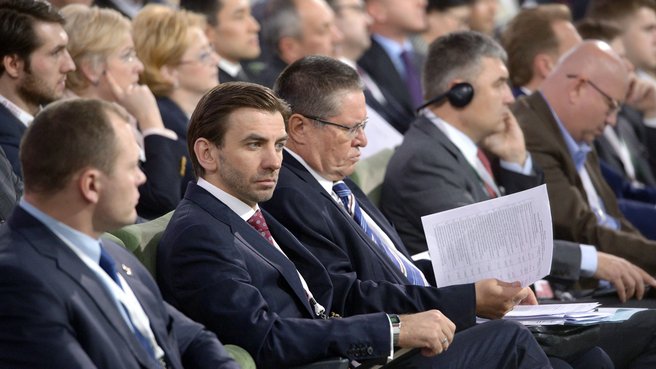
Minister for Relations with the Open Government Mikhail Abyzov and Minister of Economic Development Alexei Ulyukayev
The 5th Gaidar Forum
Good afternoon, colleagues, ladies and gentlemen. Winter has returned to Russia. It’s not as severe as in the United States, but at least the country looks like Russia again.
I’d like to express my gratitude to the forum organisers for inviting me to address you. I am particularly pleased to take part in this discussion because it is the fifth time that the forum is being held. Although this is not a long time, I would like to congratulate you on this anniversary nevertheless.
Dmitry Medvedev: "Russia looks stable against the troubled global economic backdrop. Our economy is not growing fast, but it is growing. We have a balanced budget, small sovereign debt and a low unemployment level, and we are monitoring inflation."
Over its short history, the forum has become a respected discussion platform and many leading economists and representatives of the business community and international organisations have made it a tradition to begin the new year at the Gaidar Forum in Moscow.
Related Information
Today you have started discussing the issues on the modern economic agenda, our outlook, global challenges and problems and ways to deal with them. The majority of countries that have been hit by the global crisis are now on their way to resolving their economic problems. Their efforts to improve their financial systems, to promote global trade and to maintain investment efforts have brought positive results. This is true, and we can see this from changes of the Gaidar Forum’s discussion agenda over the past few years. Several years ago – after 2008, of course – it mostly discussed ways to revive the global economy, but today we are focused on finding points of sustainable growth.
This is positive change – both in the forum’s agenda and in the global economy – but we are now facing a challenging task of sustaining the growth trajectory. No government and no country has a ready formula. There are no standard models or patterns for drawing up a post-crisis world order and dynamic development. But as Mr Mau has said, economic crises create new opportunities for growth, change the traditional directions of global growth and the established (though not always fair) geopolitical and geo-economic balance of forces, and also promote the rise of new growth leaders, production technology and entire industries. In this sense, it can be said that the world is in a new period of creative destruction, a phenomenon that, according to Joseph Schumpeter, creates the conditions for a new stage of economic development.
Dmitry Medvedev: "Оur current problems are not rooted in past mistakes. In any event, these mistakes were not so numerous. On the contrary, this is, most likely, the consequence of the successful implementation of the economic policy over the past 10-12 years. It was this policy that allowed Russia to surge ahead and to enter a qualitatively new stage, where we face entirely different challenges in terms of their nature and scale. By the way, these challenges differ completely from the ones facing Russia 10-15 years ago."
During the Sochi forum last September, I said that the time for simple solutions is over. We are facing a major intellectual challenge, and the solution to it will determine our post-crisis development and Russia’s role and place in the global world.
On the face of it, Russia looks stable against the troubled global economic backdrop, as many have noted. Our economy is not growing fast, but it is growing. We have a balanced budget, small sovereign debt and a low unemployment level, and we are monitoring inflation.
However, as everyone will agree, our development pace is cause for concern. In 2010-2012, the quarterly growth rate was nearly 4.5%, but in the second and third quarters of 2013 it slumped to 1.2%, although the average annual oil price was one of the highest ever.
Of course, there are external reasons for this, such as the economic recession of our largest trade partner, the European Union, but this is not the main point. The current economic slowdown is rooted above all in our internal development problems, in the structural and institutional limitations that prevent us from advancing to a fundamentally new stage of development.
On the one hand, we have reached a high level of prosperity by Russian standards, but on the other hand, we are approaching the time when we will have to limit the price of our workforce, which is very considerable. At the same time, we are also limited by the inadequate development of our institutions. This can affect our competition with the developed economies, which have skilled personnel and export innovative technology, as well as with low-income economies with a low pay and cheap industrial production. This is the middle-income trap, described by Barry Eichengreen, when economic growth slowdowns occur at certain mean per capita GDP.
Dmitry Medvedev: "Today, our most important task can be summed up by the word “quality.” This includes labour quality, as well as the quality of goods and proposed investment projects and, of course, the quality of management solutions. In the long run, everything that determines the quality of our life."
I would also like to note that, in my opinion, our current problems are not rooted in past mistakes. In any event, these mistakes were not so numerous. On the contrary, this is, most likely, the consequence of the successful implementation of the economic policy over the past 10-12 years. It was this policy that allowed Russia to surge ahead and to enter a qualitatively new stage, where we face entirely different challenges in terms of their nature and scale. By the way, these challenges differ completely from the ones facing Russia 10-15 years ago, the problems Yegor Gaidar talked about in the early 2000s. He said: “What we did in the early 1990s was extremely painful in social terms and politically risky, but intellectually it wasn’t difficult. The challenges facing the Government now – healthcare and pension reforms, the overhaul of the legal protection system and property rights – require a much more painstaking approach because there can be no universal prescriptions here.”
To meet these new challenges, we must renew most existing institutions and procedures, including formal and often informal procedures, which are the basis for the operation of the Russian state, business community, social institutions, individuals and civil society. This is not just a theoretical discourse. In effect, this is now the demand of the times.
Today, our most important task can be summed up by the word “quality.” This includes labour quality, as well as the quality of goods and proposed investment projects and, of course, the quality of management solutions. In the long run, everything that determines the quality of our life.
Now I would like to say a few words about Government priorities in accomplishing these objectives.
Dmitry Medvedev: "I would like to discuss efforts to improve labour quality and to promote professional growth. This is an essential condition for creating 25 million highly productive jobs by 2020. I would like to remind you that this was first mentioned by the Russian President. We must turn Russia from a country with expensive but often substandard and ineffective labour into a highly efficient workforce. In this regard, we need to ensure a flexible labour market and flexible labour legislation, and we must improve the mobility and quality of labour resources."
First, I would like to discuss efforts to improve labour quality and to promote professional growth.
This is an essential condition for creating 25 million highly productive jobs by 2020. I would like to remind you that this was first mentioned by the Russian President. We must turn Russia from a country with expensive but often substandard and ineffective labour into a highly efficient workforce.
In this regard, we need to ensure a flexible labour market and flexible labour legislation, and we must improve the mobility and quality of labour resources. Addressing the Sochi Forum, I noted that we should not artificially maintain employment at any price. At that time, this evoked certain criticism and even a wave of disapproval. Nevertheless, I believe that this premise is correct. At the same time, I would like to note what I said at that time: We need to minimise the existing social and political redundancy risks, which are considerably lower today than several years ago. How can this be explained?
First, the scale of possible redundancies is not as large as 20 or even 10 years ago.
Second, the large 1950s generation is currently retiring from the nation’s workforce, and the 1990s generation, the period when Russia started posting a demographic slump for the first time, are entering the employment market. Consequently, the share of the economically active population continues to decrease gradually. This trend may persist in the next few years. In this situation, it appears that there will be a shortage of skilled employees, rather than jobs.
Dmitry Medvedev: "The state should encourage people to look for employment at the companies facing workforce shortages, which can create the best opportunities for them. The state should help people launch their own businesses, promote personnel retraining programmes and help employees to obtain new skills for which there is demand. In other words, we should help all those who are ready to change, to improve the efficiency and quality of their work, to follow the road of modernisation."
The state should encourage people to look for employment at the companies facing workforce shortages, which can create the best opportunities for them. The state should help people launch their own businesses, promote personnel retraining programmes and help employees to obtain new skills for which there is demand. In other words, we should help all those who are ready to change, to improve the efficiency and quality of their work, to follow the road of modernisation. This will include assistance for employees and employers who ensure production growth. Incidentally, we are ready to assume a substantial share of redundancy expenses, such as the expenses required for personnel retraining, relocation and the required adaptation. In effect, we will mostly help employees themselves, all the more so as their greater mobility is a highly important resource for economic growth.
Just a few decades ago, industrialised states relocated their industrial assets to countries with a cheap workforce. Currently, these assets are returning to their home countries more and more often, but not in the form of traditional production facilities. Contemporary reindustrialisation implies the appearance of entirely new technologies, which continue to develop and improve all the time. We need highly skilled experts and high-quality education standards to operate these technologies.
Investment in training and skills is growing much faster all over the world than investment in fixed capital. This is not surprising because 90% of all discoveries and available global data were made and accumulated in the past 30 years.
And 90% of the world’s scientists and engineers are our contemporaries.
Dmitry Medvedev: "We are working together with businesses and the largest educational centres to update qualification requirements for workers, in particular, to establish professional standards for the principal professions. We also need to adopt additional incentives for the companies that invest in retraining, especially those that show the best results."
In today’s changing environment, the idea of obtaining only one degree in a lifetime is quickly becoming obsolete. After finishing education at 22, you cannot go through life relying only on the skills acquired as a student. Unfortunately, those who keep improving their professional skills and who return to studying so far constitute a minority in Russia, which is why the Government intends to support the growth of continuous education, with a special focus on training for people over the age of 40. By 2015, the proportion of workers with advanced training should increase by 10% from the current level and reach approximately 37%.
We are working together with businesses and the largest educational centres to update qualification requirements for workers, in particular, to establish professional standards for the principal professions.
We also need to adopt additional incentives for the companies that invest in retraining, especially those that show the best results.
As for small businesses, which are half as active in the area of education as large businesses, the situation is complicated. At least this is how it was in 2012. It is obvious that the main reason behind this is the lack of funds, and so we need to prepare co-financing schemes. I have recently discussed this issue with employers. We will formulate the measures that can be taken in this area.
The other two reasons behind companies’ neglect for the professional training of their personnel are inadequate understanding of the demand and the lack of suitable offers, but this is a question for the education system. I believe that the demand for education is one of the key indicators of how effective a university is, something which we should consider when assessing its operation.
Dmitry Medvedev: "The priorities are to make the Russian business environment, or the national jurisdiction, as it has become common to say, more straightforward and competitive, to remove infrastructure and institutional limitations on business, and to create an effective system of incentivising investment in the real economy, innovative projects and regional development. We are doing this in the hope that Russian investors as well as small and medium-sized businesses will join our efforts."
The knowledge sector in a modern society is a smart machine for making decisions and for resolving problems that have to do not only with technology or management, but also with those issues that determine the length of everyone’s economically active life.
A generation of very good managers has grown up in our businesses over the past two and a half decades of market economy in Russia. They have weathered the depression of the 1990s, the 1998 and 2008 crises, the period of fast growth of the 2000s and the changes of the past few years, creating their corporations virtually from scratch and improving them to a level where many of them can rival global corporations. We should apply this experience in small and medium-sized businesses. In doing this, we will rely on the development of continuous education institutions, business schools, executive education and other instruments, as well as attract efficient managers to the public sector.
I believe that the second challenge facing the Government is to make a fundamental shift in the quality of business environment.
The priorities are to make the Russian business environment, or the national jurisdiction, as it has become common to say, more straightforward and competitive, to remove infrastructure and institutional limitations on business, and to create an effective system of incentivising investment in the real economy, innovative projects and regional development. We are doing this in the hope that Russian investors as well as small and medium-sized businesses will join our efforts.
Part of this work was completed within the framework of the National Business Initiative and roadmaps. I believe that we have succeeded, to a degree, in customs administration, power generation and construction. I will provide what I consider to be the most eloquent example: consumers of up to 150 kW of electricity can be now connected to the electricity network within 180 days and electricity connection costs have been slashed to less than one-third. Until very recently, the figures were very daunting.
Russia’s place in the World Bank’s Doing Business index has changed. Over the past two years, we moved up 28 positions, and although our place is very modest so far, we have gathered very high speed. Of course, ratings are not always accurate. I know that you have discussed this issue at the Gaidar Forum. But ratings are still a very good way to determine priorities for further work and for advancing in areas where we have shown the worst results.
Dmitry Medvedev: "Getting land for construction and the necessary permits will be a simpler and more transparent procedure. Business reporting costs will be slashed in 2014; online purchases will grow to 40% of the total competitive tendering; the timeframes for state registration of ownership rights and cadastral registration will be reduced to seven and five days, respectively; registration with state non-budgetary funds for legal entities and individual entrepreneurs should be completed within one day."
Getting land for construction and the necessary permits will be a simpler and more transparent procedure. Business reporting costs will be slashed in 2014; online purchases will grow to 40% of the total competitive tendering; the timeframes for state registration of ownership rights and cadastral registration will be reduced to seven and five days, respectively; registration with state non-budgetary funds for legal entities and individual entrepreneurs should be completed within one day.
Regional and local authorities bear special responsibility for improving the business climate, because it is they that should lead the fight for investors. Leaving aside our major companies, for the majority of entrepreneurs the business climate begins and, regrettably, often ends at a municipal council or other local bodies, which issue the necessary permits and licenses, approve managerial decisions and secure (or breach) ownership rights. For this reason, I would like to address separately our governors and mayors: It would not be an exaggeration to say that you are holding in your hands the key to economic growth. In the final analysis, the economic development of regions and, consequently, national development is hinging on your readiness to help those investing money and energy in private businesses. Of course, we can also see problems involved in the development of territories as well as regional financial difficulties. To address these is our common job.
To help local teams work efficiently with potential investors, we have been applying the standard of executive authorities’ performance in regions of the Russian Federation for over a year now. Jointly with the business community we tested the standard and its monitoring mechanism in 13 pilot regions, with all other regions joining the scheme last year. We have also developed a system to estimate how efficiently the federal executive authorities and prominent public office holders in the regions work to create a favourable business environment. The task for today is to make this arrangement work and be used in practice.
Dmitry Medvedev: "The Russian economy is competing with many other economies for long-term, quality investors. Right now we urgently need investments into advanced technology, modern management, hi-tech jobs, labour productivity and a qualitatively new level of resource use."
The Russian economy is competing with many other economies for long-term, quality investors. Right now we urgently need investments into advanced technology, modern management, hi-tech jobs that I have mentioned, labour productivity and a qualitatively new level of resource use. Investors do understand that they should head where their operations will be profitable, comfortable and secure. It is often said, somewhat cynically, that patriotism ends where a tax declaration begins. We feel the pinch, too.
In terms of cost cutting, it is vitally important for this country to create a modern transport and social infrastructure. I mean the need to encourage private investment in major projects in Siberia, the Russian Far East, the housing and utilities sector, construction and innovations. There is much talk about promoting social business and public-private partnership in this sphere. But in any case, impetus is needed and this impetus should be created, including in the form of rebates on federal taxes.
Where the plan to organise faster-growth territories in Siberia and the Russian Far East is concerned, special terms will be granted to persons starting businesses in these zones, including five-year tax holiday on profits, mineral production, land use and property. I will monitor this process personally.
Another innovation expected by many investors – and we hope that it will be of use as well – is tax increment financing. This mechanism implies that a project starts without initial public investments and private investors are reimbursed from tax revenues yielded by the investment project as a whole.
Dmitry Medvedev: "Yet another problem that affects both the business community and the public and has a direct bearing on business environment quality is how to infuse more efficiency into the operation of infrastructure monopolies. We have frozen the rates and will soon introduce public oversight of infrastructure monopoly spending, price and technological audit procedures, disclosure of information on purchases, and discussion of their investment programmes."
Yet another long overdue problem that affects both the business community and the public and has a direct bearing on business environment quality is how to infuse more efficiency into the operation of infrastructure monopolies. You know that we have frozen the rates and will soon introduce public oversight of infrastructure monopoly spending, price and technological audit procedures, disclosure of information on purchases, and discussion of their investment programmes. This is being handled more actively than during the past 15 - 20 years.
We are often reproached of practicing short-term planning and making constant changes in the legal regulation of business. In part, this is fair, but not entirely.
Let me remind you that during the past one and a half years we have approved Government Priorities to 2018, a number of long-term strategies, and 39 state programmes. Of course, these instruments need to be fine tuned, but they still provide fairly clear guidance for investors, allowing them to plan long-term capital investments, attract long credit resources and create more new jobs, thereby forming real points of sustainable economic growth.
Dmitry Medvedev: "The Russian legislation has been significantly updated in recent years, also because we are striving to get it in line with WTO requirements and to harmonise its legal framework with our Belarusian and Kazakh partners as we form the Customs Union and the Common Economic Space. Our OECD membership is next in our plans, so we will continue to further improve legislation in regulating capital investments, financial markets and the environment, and in combating corruption."
The Russian legislation has been significantly updated in recent years, also because we are striving to get it in line with WTO requirements and to harmonise its legal framework with our Belarusian and Kazakh partners as we form the Customs Union and the Common Economic Space. Our OECD membership is next in our plans, so we will continue to further improve legislation in regulating capital investments, financial markets and the environment, and in combating corruption. Of course, the commitments will be based on common standards and rules, which is another positive sign. Importantly, these innovations should improve the business climate and not create additional administrative burdens on businesses. The regulatory impact assessment is being introduced in order to minimise these risks. This procedure is now mandatory for most Government regulations. Now it's the turn of the regional and local authorities.
The third set of measures concerns promoting competition. This is not only an effective incentive for innovation and cost reduction, but also an important part of high-quality economic growth. Of course, the competitive economy focuses on the efficient use of resources and adequately responds to monetary stimulation and expansion of demand through increased production, rather than higher prices. There are three basic conditions for forming a real competitive environment. They are reduction of the excessive presence of the state, an intelligent anti-monopoly policy and support for small- and medium-sized businesses. By and large, we are talking about a certain self-limitation of the authorities in certain sectors of the economy, in the area of housing and utilities and social services, where private investors and private owners are, by definition, more effective and more interested in expanding their businesses.
With regard to small- and medium-sized enterprises, our task is, as I have already said, to gain critical mass. In the EU, small businesses account for nearly half of the gross domestic product. Unfortunately, our numbers are not as high, at about 20%, or about 25% in terms of total employment. The employment rate in small- and medium-sized businesses in other European countries really stands at about 50%. Much depends on the effectiveness of state policies. Even as we streamline public spending, we continue to fund federal programmes to support small companies. The entrepreneurs receive subsidies. More than 21 billion roubles have been allocated to this end in 2014. We will also implement the decision (it’s included in the address) on two years of tax holidays for newly created enterprises in the industrial, social and research spheres. Appropriate powers should be provided to the regional authorities in 2014.
The public procurement system must become more open to small- and medium-sized businesses. The law on the contract system will go into effect in 2014. As is known, it provides significant preferences to small- and medium-sized enterprises, with at least 15% of the annual volume of orders to be handled by small businesses and socially-oriented non-profit organisations. This percentage should be even greater for small- and medium-sized entrepreneurs operating in the area of procurement by infrastructure monopolies.
Dmitry Medvedev: "Expanding the availability of credit resources to small- and medium-sized businesses is another important area. Regional guarantee funds work fairly well at the regional level. Currently, the mechanism for creating a federal guarantee fund and using the money of the National Wealth Fund on a repayable basis in order to provide loans to medium-sized businesses is being discussed."
Expanding the availability of credit resources to small- and medium-sized businesses is another important area. Regional guarantee funds work fairly well at the regional level. Currently, the mechanism for creating a federal guarantee fund and using the money of the National Wealth Fund on a repayable basis in order to provide loans to medium-sized businesses is being discussed.
In terms of property support, the validity period of the law on small-scale privatisation has been extended. I’m referring to entrepreneurs who lease premises with the right to buy. As you may recall, there were numerous discussions about the insurance premiums for sole proprietors. In light of that discussion, the decision has been revised, as you may be aware.
Colleagues, we are living in a rapidly changing world, a world of innovative ideas, materials and technology. Our progress depends on how we respond to these changes. Of course, governments have major responsibilities today. It is imperative that we work persistently to restore stability and trust on the financial markets, to remove barriers to trade and investment, to develop global and local capital markets, to create new international financial centres, to improve the quality of government regulations and to coordinate our work on the international arena.
All these steps have a specific goal, which is to make the creation of modern jobs less complicated for businesses, to create new products and services and to facilitate access to higher technical levels.
Frankly, government efforts are not enough. The authorities can only create the necessary conditions and try to implement them in a proper manner, but it’s up to us to make proper use of the opportunities, every one of us, from small business owners and employees to major companies and public organisations. Ultimately, it depends on our desire to be successful through our own work. As a wise man once said: “The motto of a true democracy is not ‘Let the government do it,’ but ‘Give us the opportunity to do it ourselves.’” Thank you.
